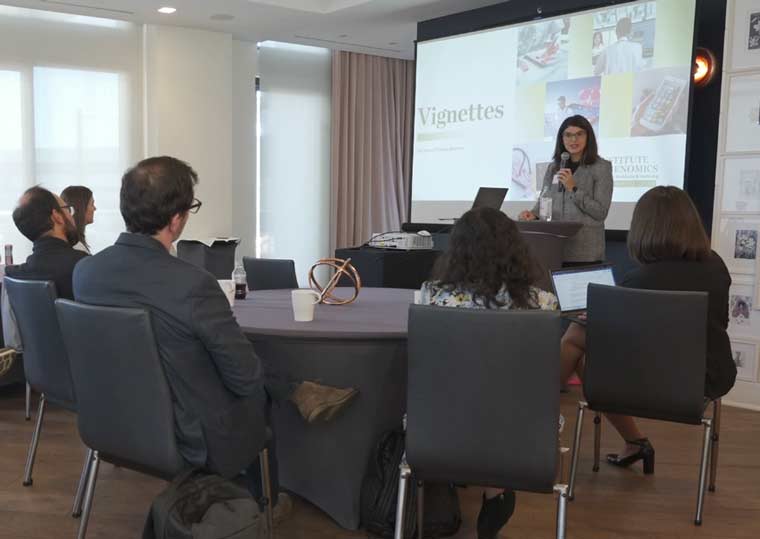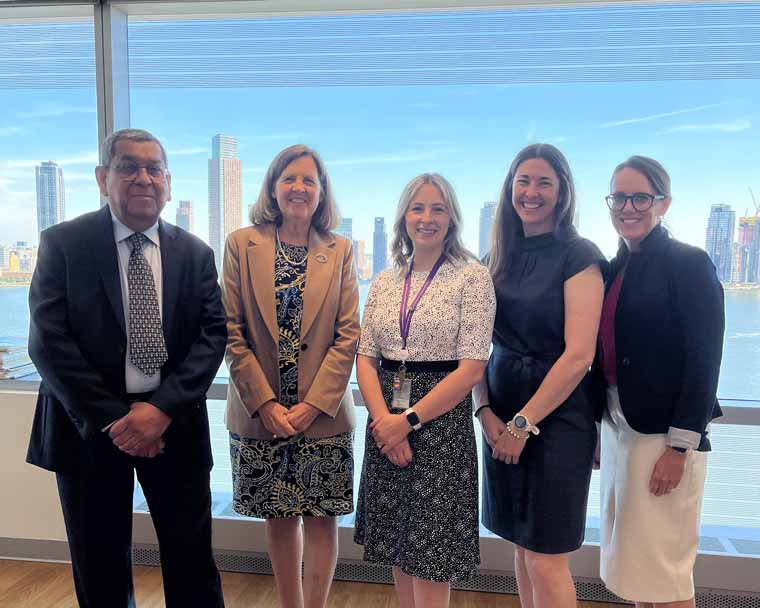
Sitting in my office today, I find myself reflecting on the work of the past year as we continue full steam ahead into a fall filled with great change. The Institute for Genomics Education Workforce & Leadership has been working tirelessly to uncover some of the biggest challenges in precision medicine, build our network of key stakeholders, and identify how we can drive an evolution toward person centered care. As we look ahead to several exciting initiatives to develop the precision health workforce for this coming year, I believe it is important to reflect on our recent past and the work we did to get us to this point of growth. This year has been packed with memorable events, valuable learnings and activities that have shaped who we are today. Join me for a walk down memory lane as we celebrate successes, learn from our experiences, and gear up for an even more dynamic 2025.
INSTITUTE LAUNCH
In September of 2023, The Institute for Genomics Education, Workforce and Leadership, kicked off our public launch with a webinar entitled “Delivering Precision Medicine: Is the Genomics Workforce Ready?“ This webinar highlighted some of our expert external advisory council members who discussed the most critical challenges they see in effectively implementing precision medicine. Our panelists and moderator discussed three critical problems impacting access to precision medicine.
Panelist Ryan Taft, former Vice President of Scientific Research at Illumina, discussed that we don’t have an innovation problem but an implementation problem. Ryan explained that when they looked at patients with cardiovascular disease, of about 1.5 million people who should be getting guidance-indicated genetic testing, less than 2% of them are actually receiving it. He continued:
And so we don’t have an innovation problem; we have an implementation problem, and the biggest gap we have is the workforce.
The webinar also revealed that access to precision medicine advances depends on your ability to advocate for yourself and your access to top-tier medical centers. Panelist Eric Dishman, who has thirty-five years of experience in the healthcare and biotech innovation fields, spoke about a woman he helped, “Verna,” who reached out to him for guidance after embarking on her third type of chemotherapy to treat an aggressive stage three cancer. Eric explained it only took him three days to connect her with a specific oncologist who used her medical history, life goals, and entire genome sequence to develop a new plan informed by that data to get her access to a therapy that had proven quite effective for people with a similar cancer progression. Eric was happy to share that Verna was in remission but pointed out that it was almost too late; without advocating for herself and charting a new care plan with an informed oncologist, Verna’s story would have unfortunately been very different. Eric summarized:
You have to know the right person who knows the right person [at a top tier medical center] to ‘get access’ to lifesaving precision medicine.
Lastly, the panel emphasized that there is no collaborative effort today tackling the implementation challenges in precision healthcare and specifically none that focus on the workforce. Panelist, Dawn Barry, former President & Co-Founder of Luna, observed that Sarah Lawrence College and the Institute for Genomics are in a unique position, as neither laboratory nor hospital, to bring stakeholders together and ideate on problems and solutions collaboratively. She explained:
We need to establish major beachheads and where those are happening, convene, collaborate, and disperse those learnings because that, to me, is very much the low-hanging fruit in terms of being able to show that when we do deploy personalized medicine, it results in better outcomes.
Inspired by the important conversations our first webinar fostered and the College’s history as the birthplace of genetic counseling through the Joan H. Marks Graduate Program in Human Genetics, we launched our vision for the Institute of Genomics at the American Society of Human Genetics 2023 Annual Meeting in an ASHGTV 2023 Film Series video: Bridging the Gap: Sarah Lawrence College and the Evolving Genomics Workforce. This video followed us as we convened stakeholders from various groups to share their unique perspectives on what the precision healthcare workforce needs most to advance.

CONVENING STAKEHOLDERS
Perspective: Genetic Counselors and Precision Healthcare
Our vision began to materialize through a series of focus groups with today’s largest genomics workforce, genetic counselors. We wanted to better understand how genetic counselors are navigating the increase in genomic technologies and advances in precision medicine, how they are responding to changes in the employment landscape, and how we can leverage this unique and specialized workforce to break down some of the barriers preventing access to precision healthcare.
These conversations helped us learn three key things:
- Genetic counselors are searching for educational opportunities to help them advance their careers in new and different spaces.
- They are concerned about their role in the future of precision healthcare and want to be part of the transformation from genetics and genomics to multi-omics precision healthcare.
- Genetic counselors desire more support in utilizing their transferable skills and transitioning into new roles in a way that helps advance patient access to precision healthcare.
Perspective: Precision Health in the Healthcare System
The next step in our journey to survey the state of precision healthcare brought us to the most obvious hub for precision medicine: healthcare systems. We convened a group of genetics and genomics professionals from hospitals, healthcare systems, and diagnostic companies to get their perspectives on the main barriers to the broad implementation of precision health technologies at the point of care. Similar to our webinar and conversations with genetic counselors, these healthcare professionals reiterated that the balance between innovation and implementation is off. A lot of time, money, and energy are spent developing innovations, but little effort is spent breaking down the system barriers to effective implementation. That reduces the impact of innovation and ultimately decreases patient access, use and downstream health benefits.
The professionals we interviewed also emphasized that the healthcare system is primarily built to deliver reactive medicine. Reactive medicine influences most of the incentives today. Without a fundamental change and support from health system administrators, it will be hard to get the overburdened clinical workforce to move toward proactive, preventative medicine. They also highlighted a lack of education in genetics, genomics, and advanced technologies across the healthcare workforce. Genetics was historically treated as a “specialty,” but we are moving to a place where genetics and genomics touchall areas of healthcare. All healthcare professionals now need a basic understanding of these practice areas and how advances affect their patients and approach.
Perspective: Barriers to Access and Implementation
Finally, to round out our perspectives on the implementation gaps in precision medicine, we attended the American Society of Human Genetics 2023 Annual meeting in Washington, D.C. and invited a small group of stakeholders who work in government, non-profits, policy, research, and technology to discuss the barriers hindering personalized medicine.
Those individuals emphasized that patients’ unique experiences impact their perception of precision medicine. A current lack of adoption of genetic and genomic technologies beyond trait and ancestry information demonstrates a lack of trust and awareness in the health benefits of these technologies for patients. We also heard that routine changes in scientific knowledge and clinical interpretation in genomics, such as variant reclassification, is confusing labs, providers, and patients. This group further supported the theme that general healthcare practitioners don’t have the education or time to support this rapid evolution. Further, our healthcare system isn’t constructed for longitudinal care. Records aren’t easily portable, and patients ultimately must navigate their own care—which is a burden on most patients. Integrating precision healthcare will require a combination of workforce, technology solutions (i.e., decision support tools), and guidelines.
NEW & EVOLVING PROGRAMS
These illuminating conversations provide evidence to support the need for an evolving portfolio of precision medicine learning opportunities and to continue our work uncovering the most innovative and impactful solutions that scale our precision health workforce. Over the past year, we have fostered development of our programs across the Institute for Genomicsand with our partners in new and exciting ways.
New Leadership for The Joan H. Marks Graduate Program in Human Genetics
This summer, The Joan H. Marks Graduate Program in Human Genetics welcomed new leadership as Katie Gallagher, MS CGC ‘15, was named Director of the Joan H. Marks Graduate Program in Human Genetics. We also welcomed Beth Georges as a new assistant program director with a focus on strategic growth and promotions for Zara Brown and Michelle Bina appointed assistant program directors in charge of admissions and student fieldwork, respectively.

New Master’s Degree in Genome Health Analysis (GHA)
In September, we celebrated the official launch of the MS program in Genome Health Analysis (GHA), co-created by Sarah Lawrence College (SLC) and NYU Grossman School of Medicine’s Vilcek Institute of Graduate Biomedical Sciences. This new program, co-Directed by Claire Davis EdD, MS, CGC (SLC) and Anna Cantor MS, MA, CGC (NYU), is training a novel type of precision medicine professional. Aravinda Chakravarti, PhD, director of the Center for Human Genetics and Genomics, and George W. Singer, Professor of Neuroscience and Physiology at NYU Langone Health, explained, “The reason why I engaged with Sarah Lawrence in the first place is they’ve been innovators in this space before.” We are eager to see how the GHA program develops healthcare professionals passionate about implementing precision medicine in the clinical setting.
New Continuing Education Program Portfolio
In addition to our degree programs, this fall we are launching a new continuing education program aimed at upskilling and re-skilling an evolving precision health workforce, starting with genetic counselors. Our first program series, GC+ Academy, was co-developed by our new head of program development, Carli Andrews, MS, CGC (MS ’19), and Claire Davis EdD, MS, CGC who in addition to her role as the co-director of the GHA program has also taken on an expanded role as the director of curriculum for the Institute for Genomics. For more information on our upcoming portfolio of courses and learning paths, please join our contact list for the updates.
Piloting New Programs
Finally, to further understand how to best integrate genomics and precision medicine education for existing healthcare providers, we are piloting programs with hospitals and health systems. These pilots are designed to better define the barriers to precision medicine implementation in their institutions and evaluate the effectiveness and scalability of different types of workforce upskilling. Our initial pilot is in progress, and we are evaluating additional opportunities with other healthcare organizations.
THE PATH AHEAD
As I reflect on all of the insights we have gathered this year, my biggest takeaways are:
- Access to lifesaving precision medicine is not equitable
- Effective implementation is hindering wide scale adoption of new advances
- Our existing healthcare workforce is not prepared to scale the delivery of precision medicine
We are moving into this next phase more committed than ever to tackle these challenges. The Institute for Genomics is taking what we have learned this past year, expanding our team and restructuring to further identify the biggest implementation gaps in precision medicine and generate opportunities to address those gaps. I look forward to sharing more about these exciting changes and how you can participate in these efforts throughout the year to come. In the meantime, I invite you to join our contact list for the latest news and Institute for Genomics events.
-Kelle Steenblock, Director of the Institute for Genomics Education, Workforce & Leadership